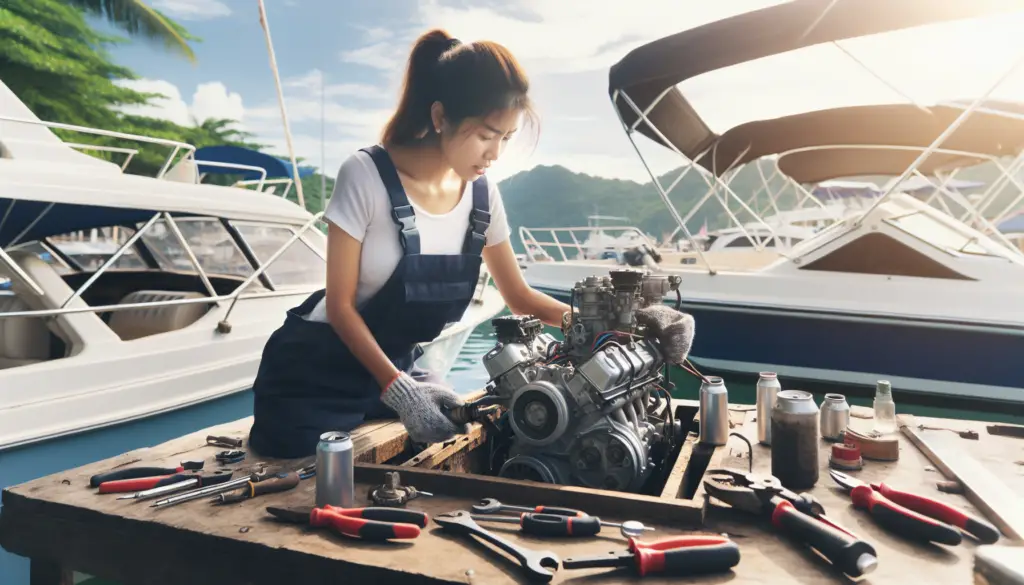Many boat owners have learned the hard way that taking proper care of your boat engine isn’t as simple or straightforward as it might seem. “Common Misconceptions About Boat Engine Care” is about to give you a much-needed reality check. Be ready to unlearn some widely held beliefs and habits as you venture into the nuanced world of boat engine maintenance. This knowledge not only saves you from costly repairs but also ensures that your trusty vessel continues to offer you those unforgettable moments at sea.

Belief That Water Doesn’t Affect The Engine
Many of you are under the impression that water doesn’t affect the boat engine, perhaps because the engine runs in water. However, that isn’t the case.
Understanding the impacts of water on engine health
Your boat engine does not enjoy water, at least not the kind it’s submerged in. Sea water or even fresh water can cause damage to the engine if it seeps into areas it shouldn’t. This can significantly jeopardize the engine’s health, leading to issues like rusting, corrosion, and in severe cases, engine failure.
Common practices that expose engines to water damage
Several practices can unknowingly expose your boat’s engine to water damage. For instance, storing your boat in water while not in use, accidental spillages, and even faulty cleaning practices can lead to water penetrating your engine.
How water can cause rust and corrosion
When water manages to enter your engine, it interacts with metallic parts causing them to oxidize, a process we commonly refer to as rusting. Over time, this rusting can lead to corrosion, thinning the metal parts and making them susceptible to breakage.
Methods to protect engine from water
Your boat’s engine as well as its interior can be safeguarded from water damage by using sealants and coatings designed to resist water. Regular check-ups for leakages and diligently repairing any cracks is crucial. When cleaning your boat’s engine, use a spray bottle to avoid excessive water exposure.
Ignoring Regular Maintenance
Another common misconception is that your boat engine has self-sustainability.
The misconception of engine self-sustainability
People often view their boat engines as highly robust and unflawed objects. Yet, just like any other machinery, your boat engine requires regular care and maintenance to ensure its optimum performance and longevity.
The role of routine check-ups in engine life
Routine maintenance helps in detection and speedy rectification of any budding mechanical issues, thereby improving your engine’s life considerably. Regular cleaning, oil changes, tune-ups, and inspections for leaks are all part of essential maintenance.
Complications that arise from neglecting regular maintenance
Neglecting regular maintenance can lead to several complications, from minor mechanical issues to major breakdowns, that could have been avoided easily. A poorly maintained engine also operates inefficiently and consumes more fuel, impacting not just engine life but also economy.
Tips for timely engine maintenance
Always refer to your engine’s manufacturer recommendations for maintenance guidelines. Consider setting reminders for important tasks like oil or filter changes to ensure punctuality. Engaging a professional for routine check-ups can also be a good idea if you’re not mechanically inclined.
Underestimating The Importance Of Oil Change
One common belief about boat engines is that they don’t require frequent oil changes.
Common beliefs about oil life in boat engines
Some of you might hold the belief that boat engines, unlike cars, don’t require frequent oil changes. But, contrary to this belief, oil needs to be changed regularly to ensure engine longevity.
The importance of regular oil changes
Oil serves as a lubricant for the engine, facilitating smooth operation while avoiding wear and tear. Over time, the oil accumulates dirt and particulates, losing its viscosity and lubricating properties, leading to an inefficient engine. Regular oil changes hence, are crucial for your engine’s living.
What happens when oil change is neglected
When oil changes are neglected, the dirt-laden oil tends to cause friction among the engine parts. This leads to an overheated engine and consequently premature engine wear.
Guidelines for properly changing boat engine oil
Your boat engine’s manufacturer’s guide should specify how often the oil should be changed. If you perform the oil changes yourself, always ensure to use the recommended type of oil. Dispose of the old oil properly to avoid environmental damage.

False Ideas About Fuel Quality
Let’s debunk the myth about fuel—the more expensive, it is not necessarily the better it is.
How fuel quality affects boat engines
Fuel quality plays a significant role in determining your boat’s engine performance. High-quality fuel burns efficiently, providing maximum engine power while ensuring lower emission levels. Poor quality fuel, on the other hand, leads to inefficient combustion, engine deposits and increased emissions.
The myth of ‘the more expensive, the better’
A higher price tag doesn’t necessarily indicate higher fuel quality. The quality of fuel depends on factors like its refinement process, additives, and cleanliness.
Signs of low quality fuel in boat engines
If your boat’s engine has been running on low-quality fuel, you might notice signs such as decreased performance, inconsistent acceleration, increased fuel consumption, or difficult starts. Over time, it might even lead to engine damages.
Suggestions for choosing the right fuel
Refer to your engine’s manufacturer recommendations to know the type of fuel best suited for your engine. Ensure the fuel source is reputable to avoid contamination and adulteration, and choose a fuel that matches the engine’s needs and specifications.
Assumptions About Winterizing Boat Engines
Many people believe that winter storage of boat engines doesn’t require any specific preparation.
Debunking myths about winter storage of boat engines
The believe that simply storing your boat engine indoors during the cold months is enough for its care is completely unfounded. Engines need to be specifically prepared, or ‘winterized’, to withstand icy conditions.
The critical need for winterizing boat engines
Winterizing your boat engine is crucial to its preservation. Cold weather can lead to freezing and cracking of engine parts, condensation leading to corrosion, and damage to fuel systems.
Potential damage due to failure to winterize
Failure to appropriately winterize your boat engine can lead to serious problems. From a seized engine due to frozen pistons, to a cracked block from freezing fluids, the resulting damage can be expensive and, in some cases, irreparable.
Step-by-step process for winterizing boat engines
Start by thoroughly cleaning your engine. Next, change the oil, run antifreeze through the engine, apply fogging oil to protect inner components, and drain the fuel system to prevent any damage from idle fuel. Always refer to your owner’s manual for a step-by-step process.
Ignoring The Importance Of Cleaning
Let’s talk about the misconception of engine auto-cleaning.
The misconception of engine ‘auto-cleaning’
Contrary to its impressively robust performance, the boat engine is not capable of cleaning itself. Engines do not possess the capacity to eliminate dust, grime and corroded parts that build up over time through regular use.
Necessity of engine clean-up
To maintain optimal performance and prevent corrosive damage, boat engines require a thorough cleaning. Regular cleaning renders the engine efficient, lasting, and less likely to falter unexpectedly.
Afflictions due to unclean engine
An unclean engine can lead to a host of issues—hard starting, poor fuel economy, stalling, overheating and even severe damages over time due to neglect.
Proper cleaning techniques for boat engines
Depending on the level of dirt, you could clean your boat engine with a simple spray or a specialised engine cleaner. Remember, your engine should be cool before cleaning and post-cleaning, ensure that the engine is dried properly.
Unfounded Beliefs About Engine Cooling
Next up is the myth about engine overheating.
Myths about engine overheating
The common belief that engines heat due to overuse is not entirely true. Engine overheating frequently points towards issues with the engine-cooling system which needs to be addressed promptly.
How engine-cooling systems work
Most watercraft engines employ a cooling system where seawater or lake water is circulated through the engine to keep it cool. If this system malfunctions, it can easily lead to overheating and potential engine damage.
Results of cooling system neglect
If your engine’s cooling system is not cleaned and maintained regularly, it can lead to a buildup of dirt and particles, leading to blocked passages. This reduces the efficiency of the cooling system over time, increasing the risk of heat damage to the engine.
Maintenance tips for engine cooling system
Regularly inspect your engine’s cooling system, including its hoses and belts, for any signs of wear or damage. Cleaning the cooling system with descaling agents once a year can help you avoid disastrous blockages. Additionally, always keep an eye on the temperature gauge to notice any spike in engine temperature.
Confusions About Fixing Engine Problems
The myth of self-healing engine is the next in line.
The myth of ‘self-healing’ engine
Engines cannot fix themselves. Any omitted mechanical issue, no matter how minor, can turn into a significant problem over time if not addressed immediately.
Hazards of ignoring minor engine problems
Bypassing small engine issues, such as leaks or abnormal noises, can lead to severe damage over time. These minor issues could be indicative of a graver underlying problem which, when ignored, can result in costly repairs or even total engine failure.
Common engine problems and how to address them
Issues like a rough idle, hard starting, or high fuel consumption can be manifestations of potential engine problems. Conducting regular check-ups and maintenance of the engine can help in early detection and mitigation of such issues.
When to seek professional help for engine issues
While it’s useful to know basic DIY maintenance, it’s equally important to recognize when to consult a professional. For complex issues or tasks like major repairs or engine tune-ups, don’t hesitate to call an expert to avoid causing further damage to your engine.
Misinterpretations About Engine Age And Performance
The belief that ‘old is gold’ doesn’t apply to boat engines.
Believing ‘old is gold’ for boat engines
Although it’s true that with proper care and maintenance, a boat engine can last several years, the concept of ‘the older the engine, the better it performs’ doesn’t hold up. Unlike wine, engines don’t improve with age.
Understanding the correlation between engine age and performance
As an engine ages, its components undergo wear and tear, decreasing the engine’s overall performance. Regular maintenance and timely part replacements can counteract some of the aging effects, but eventually all engines will reach a point where a replacement becomes necessary.
Implementing proper care for old engines
Old engines demand a high level of care to maintain their performance levels and prolong their lifespans as much as possible. Regular cleaning, timely oil changes and routine maintenance checks are all integral parts of the care regime for an old engine.
Exploring when engine replacement is necessary
There comes a time when it is more economical to replace the engine than continue pouring money into repairs and maintenance. A constant decrease in engine performance, frequent breakdowns, escalating repair costs, and unavailability of parts are strong indicators that it’s time for a replacement.
Misunderstanding Fuel Additives
A lot about fuel additives is misunderstood and hence, warrants clarity.
Confusions about the use and benefits of fuel additives
Fuel additives are often viewed as unnecessary or even damaging to the engine because of widespread misconceptions. In reality, these additives can play a crucial role in enhancing engine performance if used correctly.
How fuel additives help in enhancing engine performance
Fuel additives can help combat the adverse effects of low-quality fuel. They stabilize the fuel, clean the fuel system, reduce sludge, and improve fuel efficiency—all contributing towards better engine performance.
Understanding when and how to use fuel additives
If your boat remains unused for long periods or if you have to compromise on fuel quality, the use of fuel additives is a good idea. Usually, additives are mixed directly with the fuel in a specific ratio. Always follow the manufacturer’s instructions when using fuel additives.
Potential dangers of misuse of fuel additives
Misuse of fuel additives, such as exceeding the recommended amount, can lead to several issues. It can damage the engine’s components, cause poor fuel economy and even potentially void the engine’s warranty if not used in recommended proportions or types. Therefore, utmost care is to be taken while using these additives. It’s also worth noting that not all engines might respond positively to additives, so speak to a professional before deciding to use them.
Always remember, understanding your boat engine and its maintenance requirements is the key to ensuring its longevity and efficient performance. Ignoring these misconceptions and following proper boat engine care protocol can save you from unnecessary hassles, unbudgeted costs, and a pile of unnecessary worry. Armed with the right knowledge and maintenance practices, your journey over the waters is sure to be smooth and pleasant. Keep sailing!

